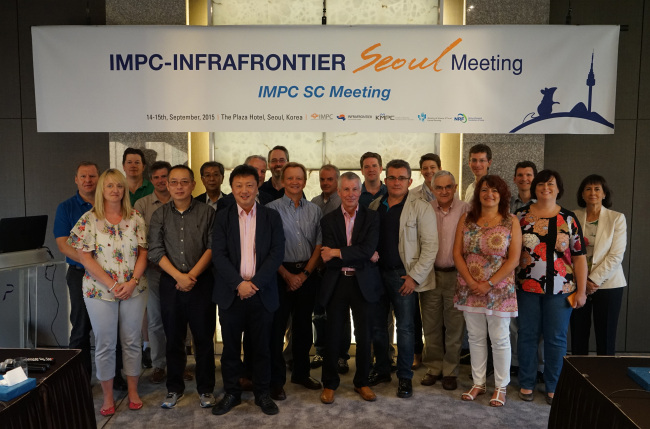S. Korean scientists see progress on mouse gene technology
By Park Ga-youngPublished : Sept. 12, 2016 - 17:15
Since a project to determine the sequence of chemical units in human genetic material was launched under the name of the Human Genome Project in 2000, many scientists around the world have tried to decode the mysteries of the human genome. At the center of this endeavor is the mouse phenotypic analysis, a method that takes advantages of the fact that mice and humans share virtually the same set of genes.
South Korean scientists are part of such efforts. The nation’s attempt to develop such a center only began in 2013 when the Korea Mouse Phenotyping Center was established. The initiative was enacted as calls to do so by scientists and researchers were answered by the Ministry of Science, ICT and Future Planning. And the joint efforts seem to have already borne some fruit.

According to the KMPC on Monday, two research projects on mouse phenotypic analysis by South Korean scientists have been published so far in 2016.
In June, a research paper by a team of professors from the Asan Institute for Life Sciences under Seoul Asan Medical Center was published in the Nature Biotechnology journal, showing research findings on the production of mutant mice using a next-generation genome editing tool called Cpf1.
The most recent paper appeared in Nature Cell Biology, a scientific journal focusing on cells, in its September edition. A team of life science professors from Seoul National University discovered that sex hormones establish a reserve pool of adult muscle stem cells, also using genetically engineered mice.
“These findings are very meaningful not only because they are the first-ever findings in related topics but also it shows the potential of South Korea’s science in phenotyping analysis,” Seong Je-kyung, director of KMPC, told The Korea Herald on Monday.
South Korea has lagged behind the US and the European Union in mutant mouse production and phenotypic analysis. Those countries formed the International Mouse Phenotyping Consortium in 2011, to which KMPC became a member in 2013. Most South Korean researchers have relied on imported genetically engineered mice due to patent issues and lack of technology or facilities.
“With these recent achievement, South Korea has become a global player and we will see more accomplishments in the near future,” Seong said.
By Park Ga-young (gypark@heraldcorp.com)


![[AtoZ into Korean mind] Humor in Korea: Navigating the line between what's funny and not](http://res.heraldm.com/phpwas/restmb_idxmake.php?idx=644&simg=/content/image/2024/04/22/20240422050642_0.jpg&u=)

![[Exclusive] Korean military set to ban iPhones over 'security' concerns](http://res.heraldm.com/phpwas/restmb_idxmake.php?idx=644&simg=/content/image/2024/04/23/20240423050599_0.jpg&u=20240423183955)

![[Herald Interview] Why Toss invited hackers to penetrate its system](http://res.heraldm.com/phpwas/restmb_idxmake.php?idx=644&simg=/content/image/2024/04/22/20240422050569_0.jpg&u=20240422150649)
![[Graphic News] 77% of young Koreans still financially dependent](http://res.heraldm.com/phpwas/restmb_idxmake.php?idx=644&simg=/content/image/2024/04/22/20240422050762_0.gif&u=)







![[Exclusive] Korean military to ban iPhones over security issues](http://res.heraldm.com/phpwas/restmb_idxmake.php?idx=652&simg=/content/image/2024/04/23/20240423050599_0.jpg&u=20240423183955)



![[Today’s K-pop] Ateez confirms US tour details](http://res.heraldm.com/phpwas/restmb_idxmake.php?idx=642&simg=/content/image/2024/04/23/20240423050700_0.jpg&u=)